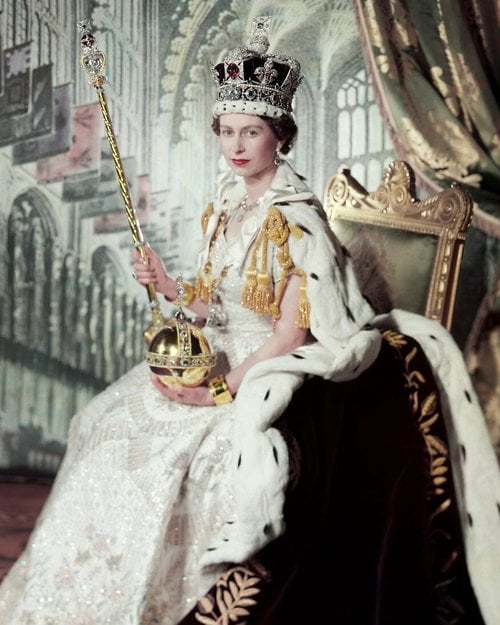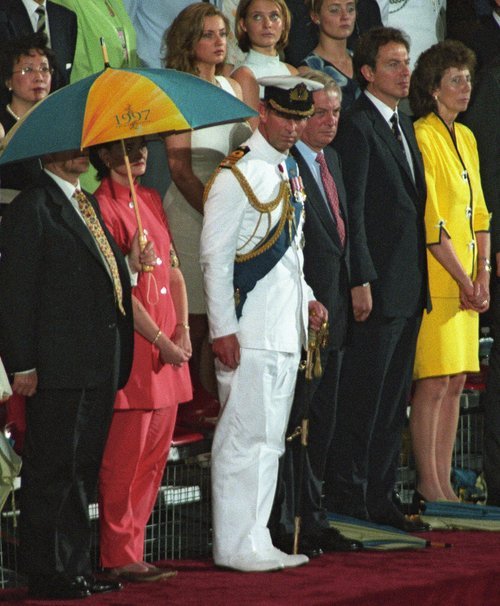The late Queen Elizabeth II (1952-2022) was the last British Monarch to preside over any semblance of an Empire. In 1952, she became Queen, not just of the UK but of Canada, Australia, South Africa, New Zealand, Pakistan, Ceylon, and a vast colonial empire that still encompassed swathes of Africa, the Middle East, and the Pacific.

Queen Elizabeth II’s official coronation, in which she wears the looted Koh-I-Noor diamond
Instituting Imperialism
Elizabeth was indisputably a Princess of Empire. After her marriage to Philip, she lived in the British colony of Malta in the Mediterranean whilst he served as an officer in the Royal Navy. Indeed, she is the only Monarch to have acceded to the throne from within the Empire. She received news of her father’s death whilst touring Kenya in 1952 as part of a wider Commonwealth tour she took on behalf of her father. The dichotomy of Elizabeth’s visit is symbolic of her reign. A few months after she toured and holidayed in Kenya, the British colonial regime declared a state of emergency and began brutally supressing the Mau Mau uprising that threatened the foundations of colonial rule in East Africa.
Like her predecessors before her, Elizabeth’s coronation was an imperial spectacle, and many hopeful commentators foretold a new ‘Elizabethan age’ of glory for the British Empire and Commonwealth in the post-war world. She continued their example and toured the Empire and Commonwealth several times, often at the behest of her UK Ministers who were eager to show Britain was still a major power capable of governing a global Empire.
But it was not to be. Anti-colonial resistance movements around the Empire, coupled with British economic weakness, had made imperial rule untenable after the Second World War. Despite waging several brutal and costly colonial wars across Africa and Asia, by the end of the 1950s it was accepted by the majority of the British political class that the Empire would have to end.
Not Going Down Without a Fight
But this acceptance came after years of bloody suppression. Kenya was not the only country to be visited by British troops in the bloody years of decolonisation. British colonial officials practised repression techniques that they had perfected over the course of imperial rule, resulting in incidents like the Hola Camp massacre in Kenya and the Batang Kali massacre in Malaya.
There is little evidence of what the Queen did and did not know about the atrocities committed in her name by the governments of the day, but much of this is due to secure records or lack thereof. The weekly audiences between UK Prime Ministers and the Monarch are strictly confidential and much of the documents relating to the end of Empire have been destroyed. It is likely that we will never truly know the full extent of what the Queen did and did not know about the Empire’s bloody end.
Power and Nostalgia
Much of Elizabeth’s power can be linked to her as a symbol of continuity. Indeed, such a point is illustrated by her funeral and the outcomes. For many, Queen Elizabeth II was the last link to Britain’s ‘glorious’ past as a world power. To victory in the Second World War. To the time when Britain held sway in every corner of the globe. Her existence on the throne for 70 years allowed a sense of continuity, a papering over the cracks.
This was the final transformation of the Monarchy’s role. Elizabeth embraced her position as Head of the Commonwealth and it is arguable that without her personal drive and interest, the organisation would have simply faded away. Successive UK governments in the 1950s and 1960s saw the Commonwealth as the successor to the Empire, a way to maintain British influence and power without the trouble of formal rule. This was similar to what the French accomplished in its former African possessions through coercive economic and personal ties. It is unknown what exactly the Queen thought, but what is clear is that the Queen was essential in securing the future of the Commonwealth. Indeed, she was able to wield significant diplomatic influence over the organisation as her disagreements over South African Apartheid with Prime Minister Margaret Thatcher illustrate. She would use her role within the Commonwealth to secure the succession of her heir, Charles III, to the title of Head of the Commonwealth.

The then Prince Charles in traditional white uniform of imperial rule, at the Handover of Hong Kong in 1997
A ‘Modern’ Monarch?
Charles III faces, for the first time in hundreds of years, a Monarchy without an Empire. Perhaps symbolically, he was present at the 1997 Handover of Hong Kong, the widely recognised symbolic end to the territorial British Empire. Indeed, even his present domains are shrinking, with many of the Caribbean countries that still name him King, agitating to abolish the Monarchy and dissolve any colonial links. Whilst he has acknowledged British involvement in the slave trade, agreed to research into his own family entanglements, and will forgo using the Koh-I-Noor diamond as part of his Coronation (whilst still using other pieces of colonial loot such as the Star of Africa), a formal apology for slavery and colonialism is still to come (never mind repatriating the vast amount of wealth and treasure his family secured in their long reign atop the pyramid of the imperial precipice).
Ultimately, the modern Monarchy remains intrinsically tied to Britain’s colonial past. It still hands out imperial medals like the Order of the British Empire, and still possesses imperial loot such as the Koh-I-Noor diamond and the Star of Africa. Still its senior members tour Commonwealth countries, as their predecessors did in the Empire. But we are told daily of their modernity and forward thinking. These are hollow words until they truly reckon with the imperial past of the British Monarchy.